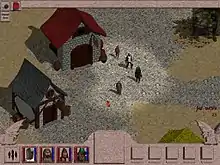Party (role-playing games)
A party is a group of characters adventuring together in a role-playing game.[1][2] In tabletop role-playing, a party is composed of a group of player characters, occasionally with the addition of non-player character allies controlled by those players or by the gamemaster.[2][3] In computer games, the relationship between the party and the players varies considerably. Online role-playing games or MMORPG parties are often, in the above sense, of the same constituency as tabletop parties,[2][3] except that the non-player allies are always controlled to a lesser or greater extent by the computer AI.[1] In single-player computer games, the player generally controls all party members to a varying degree.[1][4]

Examples of games which have parties include the tabletop RPG Vampire: the Requiem, the single-player role-playing Baldur's Gate series, MMORPGs such as World of Warcraft, Anarchy Online and Warhammer Online, and the multi-player computer action-RPG Final Fantasy XI.
Party role in gameplay
Resource management
Resource management is a crucial part of role-playing games, and any player-controlled character, whether they can participate in combat or not, are always useful if they have the ability to carry heavy or bulky items. Non-player characters or alternative player-controlled characters used by the player with only this purpose in mind are called mules.[1][3] Usually, however, and exclusively in tabletop and single-player games, party members are a valued for their tactical and/or story potential.[5][6]
Non-player character allies
Since the advent of three-dimensional and isometric computer environments in games, the use of parties and computer AI control of non-player party members has increased. Exceptions to the latter include Final Fantasy XII (itself an exception to the rest of the series in that combat and travel takes place in the same 3D environment), in which the default actions of all members of the party follows behaviour scripts bought with game money and customized by the player, unless the player took control of party members and specified their actions.
References
- Adams, Ernest (2010). Fundamentals of Game Design (2nd ed.). New Riders. pp. 492, 517. ISBN 978-0-321-64337-7. OCLC 460601644.
- Deterding, Sebastian; Zagal, José Pablo (2018). Role-Playing Game Studies: Transmedia Foundations. New York, NY: Routledge. pp. Box 2.3, Box 7.1. ISBN 978-1-315-63753-2. OCLC 1019729171.
- Tresca, Michael J. (2011). The Evolution of Fantasy Role-Playing Games. Jefferson, N.C.: McFarland & Co. pp. 159. 167, 188. ISBN 978-0-7864-6009-0. OCLC 697175248.
- Altice, Nathan. I Am Error: The Nintendo Family Computer / Entertainment System Platform. Cambridge, Massachusetts. pp. 212–214. ISBN 978-0-262-02877-6. OCLC 897401731.
- Bowman, Sarah Lynne (2010). The Functions of Role-Playing Games: How Participants Create Community, Solve Problems and Explore Identity. Jefferson, N.C.: McFarland & Co. pp. 116–118. ISBN 978-0-7864-5555-3. OCLC 610030194.
- Grayson, Nathan (May 11, 2018). "Picking An RPG Party Is Agony". Kotaku. Retrieved 2020-10-02.